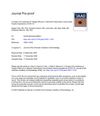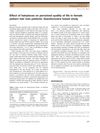 5 citations
,
November 2021 in “Skin appendage disorders”
5 citations
,
November 2021 in “Skin appendage disorders” Hair loss can cause stress and mental health issues, so treatments should address both the physical and psychological aspects, involving a team of dermatologists, psychologists, and hair specialists.
38 citations
,
March 2021 in “JAMA Dermatology” People often have negative attitudes toward those with alopecia, especially if it's severe or seen as a medical issue.
 14 citations
,
December 2020 in “Journal of The American Academy of Dermatology”
14 citations
,
December 2020 in “Journal of The American Academy of Dermatology” More people, especially Hispanic/Latinx, in certain NYC communities experienced temporary hair loss during the COVID-19 pandemic.
 19 citations
,
October 2020 in “Journal der Deutschen Dermatologischen Gesellschaft”
19 citations
,
October 2020 in “Journal der Deutschen Dermatologischen Gesellschaft” Hair loss can lead to significant stigma and lower quality of life, especially for women and those with certain types of alopecia.
 5 citations
,
July 2016 in “Canadian Urological Association journal”
5 citations
,
July 2016 in “Canadian Urological Association journal” Hair loss in women linked to higher sexual dysfunction risk.
 128 citations
,
February 2016 in “British Journal of Dermatology”
128 citations
,
February 2016 in “British Journal of Dermatology” Alopecia areata significantly lowers the quality of life, especially in emotional and mental health aspects.
2 citations
,
February 2016 in “Düşünen Adam” Venlafaxine can cause hair loss, which stops after discontinuation.
 28 citations
,
January 2015 in “Journal der Deutschen Dermatologischen Gesellschaft”
28 citations
,
January 2015 in “Journal der Deutschen Dermatologischen Gesellschaft” Women with scarring alopecia have a lower quality of life and more anxiety and depression than those with non-scarring alopecia.
3 citations
,
February 2014 in “Anadolu psikiyatri dergisi” A teenager's hair loss was caused by the drug quetiapine but improved after stopping the medication.
 48 citations
,
February 2014 in “Fertility and Sterility”
48 citations
,
February 2014 in “Fertility and Sterility” Women with PCOS often have hair loss, which is linked to acne or excess body hair but not to worse hormone or metabolic issues.
6 citations
,
July 2013 in “JAMA dermatology” The research explored how children in school view peers with alopecia areata.
 3 citations
,
June 2013 in “Journal of Dermatology”
3 citations
,
June 2013 in “Journal of Dermatology” Hairpieces improve quality of life for women with hair loss.
 40 citations
,
February 2013 in “American Journal of Clinical Dermatology”
40 citations
,
February 2013 in “American Journal of Clinical Dermatology” People with hair loss feel more depressed and anxious, especially women, and need help managing emotions and beliefs about their condition.
 19 citations
,
January 2013 in “Journal of Cutaneous Medicine and Surgery”
19 citations
,
January 2013 in “Journal of Cutaneous Medicine and Surgery” Alopecia patients struggle with emotions and stress, and improving emotional intelligence may help manage hair loss.
 27 citations
,
September 2012 in “Dermatologic Clinics”
27 citations
,
September 2012 in “Dermatologic Clinics” The document concludes that using specific tools and tests is essential for identifying the cause of hair loss and deciding on the right treatment.
 218 citations
,
April 2012 in “British Journal of Dermatology”
218 citations
,
April 2012 in “British Journal of Dermatology” Guidelines suggest various treatments for alopecia areata, but leaving it untreated is also an option as 80% cases may recover on their own.
 16 citations
,
January 2011 in “Indian Journal of Dermatology”
16 citations
,
January 2011 in “Indian Journal of Dermatology” Most patients with cicatricial alopecias face significant psychological and social challenges due to their hair loss.
 20 citations
,
July 2009 in “Journal of Pediatric and Adolescent Gynecology”
20 citations
,
July 2009 in “Journal of Pediatric and Adolescent Gynecology” Quick treatment of hair disorders in teenage girls is important because of the emotional effects.
254 citations
,
December 2003 in “Journal of the American Academy of Dermatology” Accurate diagnosis and aggressive treatment are crucial to prevent permanent hair loss in cicatricial alopecia.
 174 citations
,
November 2002 in “Expert Reviews in Molecular Medicine”
174 citations
,
November 2002 in “Expert Reviews in Molecular Medicine” Hair loss needs more research for better treatments.
 138 citations
,
March 2001 in “Clinics in Dermatology”
138 citations
,
March 2001 in “Clinics in Dermatology” Hair loss can significantly affect a person's self-esteem and body image, especially in young people, those who value their looks highly, and women.
 74 citations
,
January 1998 in “Dermatology”
74 citations
,
January 1998 in “Dermatology” Men who think they are losing hair feel worse about themselves, especially if they are younger.
 38 citations
,
September 1996 in “Annals of Clinical Psychiatry”
38 citations
,
September 1996 in “Annals of Clinical Psychiatry” Hair loss from mood stabilizers is common but can be managed without stopping the medication.
 222 citations
,
October 1993 in “Journal of The American Academy of Dermatology”
222 citations
,
October 1993 in “Journal of The American Academy of Dermatology” Hair loss affects women's mental health more than men's, causing anxiety, low self-esteem, and social insecurity.
 192 citations
,
June 1992 in “Journal of The American Academy of Dermatology”
192 citations
,
June 1992 in “Journal of The American Academy of Dermatology” Hair loss can cause low self-esteem, anxiety, and depression in men.




























